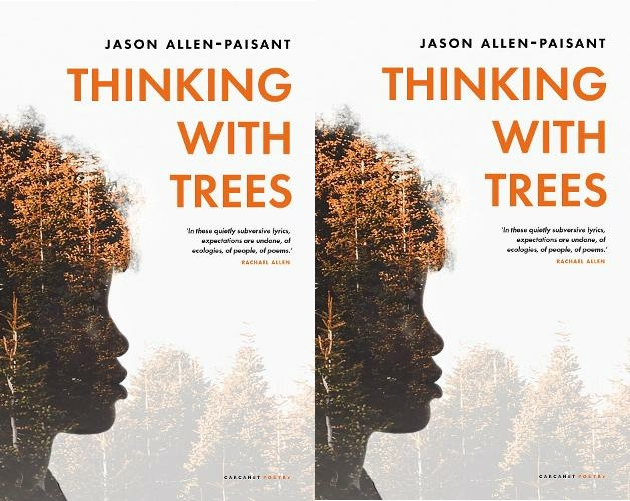Our Poetry Editor, Lawrence Illsley reviews Thinking With Trees by Jason Allen-Paisant from Carcanet Press
We are led into this collection as if by hand, down a path into the woods. In the first poem Crossing the Threshold we are shown ‘a bedding of brown leaves’, ‘water with shadows’ and ‘black soil’ We are given the image of a black man. He ‘comes through the thicket.’ Allen-Paisant was born in Manchester, Jamaica but lives in Leeds, England and his poetry explores a difference in experience between the two places. How, for Allen-Paisant, the woods in England are associated with play and the woods in Jamaica with work and how this difference relates to skin colour. How as a black man in English woods he feels ‘out of place’.
This difference comes to focus in the brilliant fifth poem Daffodils. The poem begins as a challenge to Wordsworth, ‘It’s time to write about daffodils / again’. But it soon becomes a challenge to everyone, ending with the demand ‘you must / try to imagine daffodils / in the hands of a black family’. Not just in the city but in the countryside. This is a challenge particularly suited to poetry as it is concerned with an image – what, or who, do we expect to see when we are out for a walk in the woods? This poem primes us for the collection, for what is to come.
Allen-Paisant takes the challenge upon himself. He finds a solution in action. In walking. In being in the trees. In writing these poems. In the First Day of Autumn we realise this collection is part of ‘the work of / making the land home.’
These are walking poems. Long, straggly, meandering poems with short lines, and different length stanzas. There is no punctuation, the words free, like the mind, to roam where perhaps the body is not. They are full of observation and sights, of witnessing. We see trees and woods and images of skin and blackness. The language is descriptive and located, these are poems of experience not allusion, they are rarely metaphorical apart from the occasional delicious comparison, when rocks are alligators, or where there are gladiator buds and galaxies of sepals.
After the description comes the reflection and we understand that these are also thinking poems. Walking through trees thinking. It suddenly feels as if the form of each poem is perhaps more rhizomic than arboreal. Which, following Deleuze and Guattari in A Thousand Plateaus, provides a more nuanced metaphor for thinking. These poems feel progressive, they are thinking alongside trees as opposed to thinking using trees.
These then are also political poems. Where walking in nature is an act of occupation. How ‘To occupy space / is to occupy time.’ Allen-Paisant suggests in Leisure 1 the need to ‘learn to carry your body with the confidence of those entitled / to time’. He says, ‘this walking is not easy’. There is threat and resistance, we see the repeated appearance of barking dogs and their owners. There is history, ‘I hear the ancestors saying we / have avoided the woods’. Trees have meant work and persecution, such as in Logwood ‘that image of bare-backed men struggling with a log,’ or in the magnificent For those who steal away ‘How Lord / did you teach the soul of the slave / to grow into a tree / the murdered body to burst / out of the ground like cedar’.
It is not easy, but it is necessary. Eventually Allen-Paisant finds belonging, ‘among the oaks / my skin is a type of bark’. And in the final poem Twilight in Roundhay he ends with a new challenge to himself. ‘I will learn to name this me / walking through the park’. Thereby returning us to the names of the English trees ‘Oak, maple, birch’ he offered us in the second poem Naming; placing himself alongside these trees both in the landscape of England and in the language. And we are left to decide whether we are comfortable with this.
This is a long collection, and my only criticism is that perhaps it is too long. It feels that some of the middle poems reiterate earlier themes and could have been astutely coppiced, edited away to give those that are left more space to breathe and have impact. But this is a minor criticism of a powerful first collection that feels important and current. Here Allen-Paisant takes a massive stride on the important journey of reimagining our collective space in England and beyond. Essential reading.
Buy a copy of Thinking With Trees here
